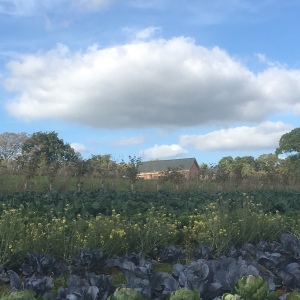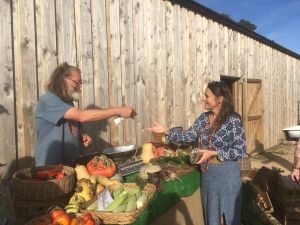
The enclosure of common land across the centuries, or the privatisation of British land, is where many modern problems began. Subsistence farmers, the peasant class, were wrenched from their land by rich men’s control and might.
“A time there was, ere England’s griefs began,
When every rood of ground maintained its man;
For him light labour spread her wholesome store,
Just gave what life required, but gave no more:”
What a great description of sustainability. Thank you, Oliver Goldsmith (1728 –1774), Irish novelist (The Vicar of Wakefield), poet, and playwright (She Stoops to Conquer).
The struggle to retain our natural rights – grow food and be in nature – continues. Last weekend, I was at the launch of the Apricot Centre at Huxhams Cross Farm in Dartington, Devon (images).
Thanks to the Apricot Centre CIC, the Biodynamic Land Trust and its many supporters, the land at Huxhams Cross Farm has been reclaimed and put into community ownership.
In his poem, The Deserted Village (1770), Oliver Goldsmith
“… laments the decline of rural life and the depopulation of the countryside as a result of land enclosure,” writes Diane Maybank in her introduction to She Stoops to Conquer.

This poem is as relevant as ever. I have edited it for passages which shouted to me through the ages. The complete poem is here.
The Deserted Village
by Oliver Goldsmith
Sweet Auburn, loveliest village of the plain,
Where health and plenty cheered the labouring swain,
…How often have I loitered o’er thy green,
Where humble happiness endeared each scene!
How often have I paused on every charm,
The sheltered cot, the cultivated farm,
The never-failing brook, the busy mill,
The decent church that topt the neighbouring hill,
The hawthorn bush, with seats beneath the shade,
For talking age and whispering lovers made!
How often have I blest the coming day,
When toil remitting lent its turn to play,
And all the village train, from labour free,
Led up their sports beneath the spreading tree,
…These were thy charms, sweet village; sports like these,
With sweet succession, taught even toil to please;
These round thy bowers their cheerful influence shed,
These were thy charms—But all these charms are fled.
Sweet smiling village, loveliest of the lawn,
Thy sports are fled, and all thy charms withdrawn;
Amidst thy bowers the tyrant’s hand is seen,
And desolation saddens all thy green:
One only master grasps the whole domain,
And half a tillage stints thy smiling plain;
No more thy glassy brook reflects the day,
But, choked with sedges, works its weedy way;
Along thy glades, a solitary guest,
The hollow-sounding bittern guards its nest;
Amidst thy desert walks the lapwing flies,
And tires their echoes with unvaried cries.
Sunk are thy bowers, in shapeless ruin all,
And the long grass o’ertops the mouldering wall;
And, trembling, shrinking from the spoiler’s hand,
Far, far away, thy children leave the land.
Ill fares the land, to hastening ills a prey,
Where wealth accumulates, and men decay:
Princes and lords may flourish, or may fade;
A breath can make them, as a breath has made;
But a bold peasantry, their country’s pride,
When once destroyed, can never be supplied.
A time there was, ere England’s griefs began,
When every rood of ground maintained its man;
For him light labour spread her wholesome store,
Just gave what life required, but gave no more:
His best companions, innocence and health;
And his best riches, ignorance of wealth.
But times are altered; trade’s unfeeling train
Usurp the land and dispossess the swain;
Along the lawn, where scattered hamlets rose,
Unwieldy wealth and cumbrous pomp repose;
And every want to opulence allied,
And every pang that folly pays to pride.
Those gentle hours that plenty bade to bloom,
Those calm desires that asked but little room,
Those healthful sports that graced the peaceful scene,
Lived in each look, and brightened all the green;
These, far departing seek a kinder shore,
And rural mirth and manners are no more.
Sweet Auburn! parent of the blissful hour,
Thy glades forlorn confess the tyrant’s power.
Here as I take my solitary rounds,
Amidst thy tangling walks, and ruined grounds,
And, many a year elapsed, return to view
Where once the cottage stood, the hawthorn grew,
Remembrance wakes with all her busy train,
Swells at my breast, and turns the past to pain.
…Sweet was the sound, when oft at evening’s close,
Up yonder hill the village murmur rose;
There, as I passed with careless steps and slow,
The mingling notes came soften’d from below;
The swain responsive as the milk-maid sung,
The sober herd that lowed to meet their young,
The noisy geese that gabbled o’er the pool,
The playful children just let loose from school,
The watchdog’s voice that bayed the whispering wind,
And the loud laugh that spoke the vacant mind,
These all in sweet confusion sought the shade,
And filled each pause the nightingale had made.
But now the sounds of population fail,
No cheerful murmurs fluctuate in the gale,
No busy steps the grass-grown foot-way tread,
For all the bloomy flush of life is fled.
All but yon widowed, solitary thing
That feebly bends beside the plashy spring;
She, wretched matron, forced in age, for bread,
To strip the brook with mantling cresses spread,
To pick her wintry faggot from the thorn,
To seek her nightly shed, and weep till morn;
She only left of all the harmless train,
The sad historian of the pensive plain.
…Near yonder thorn, that lifts its head on high,
Where once the sign-post caught the passing eye,
Low lies that house where nut-brown draughts inspired,
Where grey-beard mirth and smiling toil retired,
Where village statesmen talked with looks profound,
And news much older than their ale went round.
Imagination fondly stoops to trace
The parlour splendours of that festive place;
The white-washed wall, the nicely sanded floor,
The varnished clock that clicked behind the door;
The chest contrived a double debt to pay,
A bed by night, a chest of drawers by day;
The pictures placed for ornament and use,
The twelve good rules, the royal game of goose;
The hearth, except when winter chill’d the day,
With aspen boughs, and flowers, and fennel gay;
While broken tea-cups, wisely kept for shew,
Ranged o’er the chimney, glistened in a row.
Vain transitory splendours! Could not all
Reprieve the tottering mansion from its fall!
Obscure it sinks, nor shall it more impart
An hour’s importance to the poor man’s heart;
Thither no more the peasant shall repair
To sweet oblivion of his daily care;
No more the farmer’s news, the barber’s tale,
No more the woodman’s ballad shall prevail;
…Yes! let the rich deride, the proud disdain,
These simple blessings of the lowly train;
To me more dear, congenial to my heart,
One native charm, than all the gloss of art;
Spontaneous joys, where Nature has its play,
The soul adopts, and owns their first-born sway;
Lightly they frolic o’er the vacant mind,
Unenvied, unmolested, unconfined.
But the long pomp, the midnight masquerade,
With all the freaks of wanton wealth arrayed,
In these, ere triflers half their wish obtain,
The toiling pleasure sickens into pain;
And, even while fashion’s brightest arts decoy,
The heart distrusting asks, if this be joy.
Ye friends to truth, ye statesmen who survey
The rich man’s joys increase, the poor’s decay,
‘Tis yours to judge, how wide the limits stand
Between a splendid and a happy land.
Proud swells the tide with loads of freighted ore,
And shouting Folly hails them from her shore;
Hoards even beyond the miser’s wish abound,
And rich men flock from all the world around.
Yet count our gains. This wealth is but a name
That leaves our useful products still the same.
Not so the loss. The man of wealth and pride
Takes up a space that many poor supplied;
Space for his lake, his park’s extended bounds,
Space for his horses, equipage, and hounds:
The robe that wraps his limbs in silken sloth,
Has robbed the neighbouring fields of half their growth;
His seat, where solitary sports are seen,
Indignant spurns the cottage from the green:
Around the world each needful product flies,
For all the luxuries the world supplies.
While thus the land adorned for pleasure, all
In barren splendour feebly waits the fall.
…Thus fares the land, by luxury betrayed:
In nature’s simplest charms at first arrayed;
But verging to decline, its splendours rise,
Its vistas strike, its palaces surprize;
While, scourged by famine from the smiling land,
The mournful peasant leads his humble band;
And while he sinks, without one arm to save,
The country blooms—a garden, and a grave.
Where then, ah where, shall poverty reside,
To ‘scape the pressure of contiguous pride?
If to some common’s fenceless limits strayed,
He drives his flock to pick the scanty blade,
Those fenceless fields the sons of wealth divide,
And ev’n the bare-worn common is denied.
If to the city sped—What waits him there?
To see profusion that he must not share;
…Ah, turn thine eyes
Where the poor houseless shivering female lies.
She once, perhaps, in village plenty blest,
Has wept at tales of innocence distrest;
Her modest looks the cottage might adorn
Sweet as the primrose peeps beneath the thorn:
Now lost to all; her friends, her virtue fled,
Near her betrayer’s door she lays her head,
And, pinch’d with cold, and shrinking from the shower,
With heavy heart deplores that luckless hour
When idly first, ambitious of the town,
She left her wheel and robes of country brown.
Do thine, sweet Auburn, thine, the loveliest train,
Do thy fair tribes participate her pain?
…O luxury! thou curst by Heaven’s decree,
How ill exchanged are things like these for thee!
How do thy potions, with insidious joy,
Diffuse their pleasures only to destroy!
Kingdoms, by thee, to sickly greatness grown,
Boast of a florid vigour not their own;
At every draught more large and large they grow,
A bloated mass of rank unwieldy woe;
Till sapped their strength, and every part unsound,
Down, down they sink, and spread a ruin round.
Even now the devastation is begun,
And half the business of destruction done;
Even now, methinks, as pondering here I stand,
I see the rural virtues leave the land:
Down where yon anchoring vessel spreads the sail,
That idly waiting flaps with every gale,
Downward they move, a melancholy band,
Pass from the shore, and darken all the strand.
Contented toil, and hospitable care,
And kind connubial tenderness, are there;
And piety with wishes placed above,
And steady loyalty, and faithful love.
And thou, sweet Poetry, thou loveliest maid,
Still first to fly where sensual joys invade;
Unfit in these degenerate times of shame,
To catch the heart, or strike for honest fame;
Dear charming nymph, neglected and decried,
My shame in crowds, my solitary pride;
Thou source of all my bliss, and all my woe,
That found’st me poor at first, and keep’st me so;
Thou guide by which the nobler arts excell,
Thou nurse of every virtue, fare thee well!
Farewell, and O where’er thy voice be tried,
On Torno’s cliffs, or Pambamarca’s side,
Whether were equinoctial fervours glow,
Or winter wraps the polar world in snow,
Still let thy voice, prevailing over time,
Redress the rigours of the inclement clime;
Aid slighted truth with thy persuasive strain,
Teach erring man to spurn the rage of gain;
Teach him, that states of native strength possest,
Tho’ very poor, may still be very blest;
That trade’s proud empire hastes to swift decay,
As ocean sweeps the labour’d mole away;
While self-dependent power can time defy,
As rocks resist the billows and the sky.
[Source: Poets of the English Language (Viking Press, 1950)]










